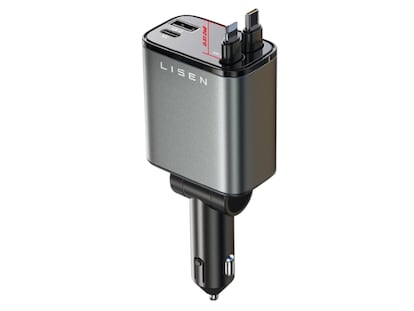Cable en el que Espa?a afirma a EE UU que sus puertos son seguros
Espa?a asegur¨® ante Estados Unidos que los puertos espa?oles son m¨¢s seguros que otros de Europa por la amenaza de ETA
| ID: | 18550 |
| Date: | 2004-07-09 08:02:00 |
| Origin: | 04MADRID2605 |
| Source: | Embassy Madrid |
| Classification: | UNCLASSIFIED |
| Dunno: | 04STATE85792 |
| Destination: | This record is a partial extract of the original cable. The full text of the original cable is not available. |
UNCLAS SECTION 01 OF 02 MADRID 002605 SIPDIS STATE FOR EB/TRA/OTP E.O. 12958: N/A TAGS: AMGT, EWWT, ACOA, ASEC, ETRD, ECON, ETTC, ENRG, PARM, PTER, PHSA, SP, Counterterrorism SUBJECT: SPAIN: MARINE SECURITY PROGRAMS REF: STATE 85792 1. SUMMARY: Per reftel request, we interviewed Spanish officials regarding marine security programs. No single GOS agency is responsible for marine security. Each regional port authority is responsible to assure that ports in its jurisdiction comply with International Ship and Port Facilities Code (ISPS) protocol. Ports of State (or Puertos de Estado), loosely affiliated with the Ministry of Public Works, has been helping ready applicable ports for ISPS compliance, although it is not directly responsible for any port security issues. Contacts from the Ports of State informed us that they were confident preparations for the 1 July deadline would be met, and that they believe the state of port security in Spain is generally higher than in most European ports due to Spain,s experience with homegrown terrorist groups. Spain,s Merchant Marine is responsible for ISPS and Safety of Life at Sea (SOLAS) regulations for applicable ships. Additionally, the USG and GOS are collaborating on several security initiatives. The Department of Energy's (DOE) Megaports Initiative continues to progress, with a DOE team arriving for a familiarization tour of the Port of Algeciras in late July. The Container Security Initiative will begin implementation in late July as well when a USG-owned scanner will be lent to the GOS for use in Algeciras. END SUMMARY. SPAIN,S ISPS PLANS: PORT FACILITIES 2. The ports of Spain are implementing a series of port security measures to comply with the ISPS. According to Pedro Roman, Safety and Security Department Manager of Infrastructures and Port Services Directorate, the ISPS code only applies to 50 port facilities in Spain, known as Ports of General Interest (or Puertos de Interes General). They are designated as such because of their international importance or volume of traffic. Ports of General Interest are overseen by the Ports of State of Spain through 27 regional port authorities. According to Roman, only those Ports of General Interest that receive ships carrying loads greater than 500 gross tons and/or receive any international passengers must comply with the ISPS. Each regional port authority (and not the Ports of State) is directly responsible for assuring compliance by all ports within its jurisdiction. Roman reiterated that Spain's ports do not have a true centralized management structure. Because of this fact, there is no fully-coordinated port facilities security plan. The individual port authorities will develop their own security plans within the context of the ISPS code. 3. The ports that are not Ports of General Interest are known as Autonomous Ports (or Puertos Autonomos). They answer to the Ministry of Public Administration. Autonomous Ports are generally not involved in international trade, with the exception of specialized businesses such as shipment of salt to France and Italy. They mostly service local fishing, transportation, or commercial activities. Per Roman, these ports are not required to comply with ISPS, and are not being briefed on its requirements. 4. In an attempt to guide ISPS compliance efforts, Ports of State has outlined the following steps necessary for compliance to ISPS requirements for each Port of General Interest: -- Designate a port security officer, who must pass a course on port installation security given by Ports of State, -- Create a port facilities security plan. The regional port authority that has jurisdiction over a specific port is responsible for reviewing and approving its port facilities security plan, and -- Ports of State will evaluate each port, using a computerized port security program that is currently under development. This computer program is based on US Coast Guard port security methodologies and relevant regulations. Eventually, a classified port security computer network, based on this evaluation program, will link all ISPS-compliant Spanish ports. 5. Contacts from Ports of State were confident that applicable ports would be ready to begin compliance procedures for the 1 July deadline. Mr. Roman views this deadline, however, as the date by which all of the ports would start their preparations for ISPS compliance and not necessarily be fully compliant with ISPS protocol. According to the President of the Ports of State Mariano Navas, preparations for ISPS compliance have been easier for Spanish ports than other European ports, because of their already heightened awareness of terrorist issues. Nationalist terrorism has been a threat in Spain since the 1970's, from Basque separatist terror organizations. Due to this ongoing threat, the Spanish have protected their ports more than other European countries, said Navas. Nevertheless, Spanish ports still lack the equipment and training to combat nuclear threats or track the shipment of illegally transported nuclear materials. SPAIN,S ISPS PLANS: VESSELS 6. Spain,s Merchant Marine is responsible for the security of ships at sea and notification of cargo and personnel. As with the Ports of State, the Merchant Marine is nominally connected to the Ministry of Public Works. Per Roman, the Merchant Marine will adapt its systems to comply with chapters 5 and 11 of ISPS requirements on the automatic identification system for ships. The Merchant Marine will use these guidelines to check cargo and passengers, first by use of a physical logbook, then by a computer system to be installed at a later date. MEGAPORTS INITIATIVE 7. The implementation of the Department of Energy's (DOE) Megaports Initiative should increase Spain's ability to protect against illegal shipment of nuclear or radioactive material usable for terrorism by way of commercial traffic. We are expecting a team from the DOE to arrive in mid-July for a familiarization tour of the Port of Algeciras, where the DOE is planning to install Megaports equipment and train personnel. The Megaports Initiative Memorandum of Agreement should be signed in late July, with a detailed technical inspection and planning visit to Algeciras in late September or early October. CONTAINER SECURITY INITIATIVE (CSI) 8. Progress was made in early July when the GOS agreed to accept the loan of a particular scanner for activation of the CSI program in Algeciras. Various Department of Homeland Security personnel are expected to arrive in Spain in late July to participate in CSI,s Algeciras implementation. Progress has been extremely slow, however, on the GOS tender for purchase of a scanner for CSI. Ports of State President Navas (who only recently has taken office), said that his organization is still determining the best specifications for Spanish ports. 9. COMMENT: Roman, the Safety and Security Manager of the Ports of Spain admitted to being almost exhausted from the effort that he has undertaken in moving Spain,s Ports of General Interest toward compliance with ISPS. His description of processes, and his clear delineation of his responsibilities from those of other port authorities, made it seem that he was looking forward to the completion of his part of the ISPS implementation program. Additionally, President Navas seemed interested in resolving the problems surrounding procurement of scanners and training. We hope to see movement on the tender by early autumn. End Comment. MANZANARES |
Traducci¨®n autom¨¢tica. Puede que el texto traducido no sea fiel al original
Tu suscripci¨®n se est¨¢ usando en otro dispositivo
?Quieres a?adir otro usuario a tu suscripci¨®n?
Si contin¨²as leyendo en este dispositivo, no se podr¨¢ leer en el otro.
FlechaTu suscripci¨®n se est¨¢ usando en otro dispositivo y solo puedes acceder a EL PA?S desde un dispositivo a la vez.
Si quieres compartir tu cuenta, cambia tu suscripci¨®n a la modalidad Premium, as¨ª podr¨¢s a?adir otro usuario. Cada uno acceder¨¢ con su propia cuenta de email, lo que os permitir¨¢ personalizar vuestra experiencia en EL PA?S.
?Tienes una suscripci¨®n de empresa? Accede aqu¨ª para contratar m¨¢s cuentas.
En el caso de no saber qui¨¦n est¨¢ usando tu cuenta, te recomendamos cambiar tu contrase?a aqu¨ª.
Si decides continuar compartiendo tu cuenta, este mensaje se mostrar¨¢ en tu dispositivo y en el de la otra persona que est¨¢ usando tu cuenta de forma indefinida, afectando a tu experiencia de lectura. Puedes consultar aqu¨ª los t¨¦rminos y condiciones de la suscripci¨®n digital.




























































